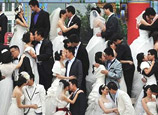
Statistics released by the national poverty alleviation authorities show government-sponsored efforts to help people out of poverty have made further progress. However, they should also be a reminder that non-economic measures are also needed if the country is to attain its goal of building a well-off society in an all-round way.
According to the office that oversees national poverty alleviation and development, with the help of government-subsidized projects, 23.39 million people were pulled out of poverty in China's rural areas in 2012, reducing the number of poor in the country by 10.2 percent to 98.99 million.
This is undoubtedly an appreciable feat for a populous nation whose economic development is still very uneven. Especially as the government raised the poverty threshold to 2,300 yuan ($368) a year in November 2011, which resulted in the number of people judged to be living in poverty increasing to 128 million, nearly one-tenth of the country's total population.
The raising of the poverty threshold - bringing it closer to the international standard of $1.25 a day - reflected the government's down-to-earth attitude toward poverty alleviation and its greater efforts to bridge the country's widening wealth gap.
However, all the talk of building a well-off society in an all-round way will ring hollow if tens of millions of people are struggling for subsistence in the country.
Although most of the poor are concentrated in rural areas, moving to the cities does not guarantee that poverty will not follow them. China's booming urbanization over the past decades has brought hundreds of millions of rural residents to cities, but a large number of them are still denied legal identities as urban residents.
As these people are thus excluded from the welfare provision such as the minimum living allowance and healthcare subsidies that local authorities extend to urban residents, this group could easily become the urban poor when they should be benefiting more from urbanization.
Artificial barriers have not only prevented migrant workers from integrating into the cities, they have also effectively hindered their pursuit of a better life and higher incomes.
Removing these barriers and admitting rural workers into the urban welfare system will facilitate both a higher quality of urbanization and the nation's poverty alleviation endeavors.
















 Public letter calls for gay marriage legislation
Public letter calls for gay marriage legislation


![]()
